Socceroos’ historic World Cup win over Denmark defined by fighting spirit as Australia advances to Round of 16
It was the greatest goal in Socceroos history and the greatest night. ADAM PEACOCK analyses a historic moment for Australian football.

Football
Don't miss out on the headlines from Football. Followed categories will be added to My News.
Tell your kids. Tell your loved ones. Tell your mates.
Whisper it, yell it, scream it, put it on a T-shirt and wear it to bed.
Hard work gets you places.
The knockout stages of a World Cup, for starters.
An hour into one of the biggest Socceroos games in history, four days after the last one, hard work had got the Socceroos to a point, but more was needed.
Mat Leckie had spilled everything, when everything had already been given. The veteran, playing his ninth Socceroos World Cup match to equal the record held by Tim Cahill and Mark Bresciano, had already done as much running as the previous eight combined.
And then he was released on halfway with only Denmark’s Joakim Maehle for company.
Fifty metres looked like five-hundred for Leckie and the Socceroos because, for all their hard work to that point, the picture had just changed dramatically.
Twenty-two minutes away, Tunisia had scored against France. At 0-0, all the sweat that the Socceroos had put into nullifying Denmark was enough.
A Round of 16 spot was theirs – and then it wasn’t.
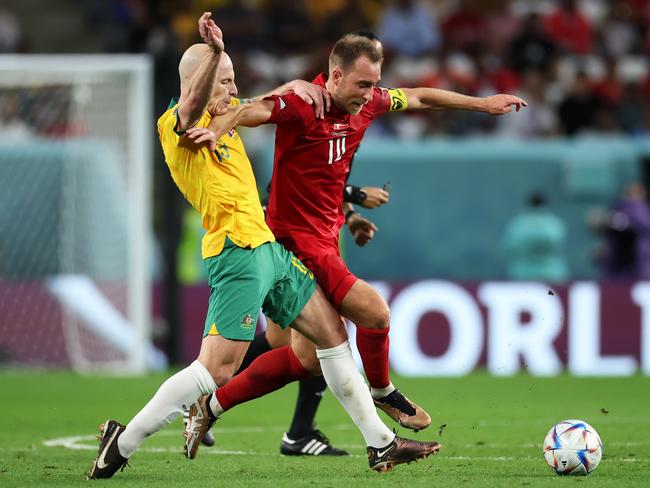
Leckie, oblivious to anything other than getting air back in his lungs, barrelled on with one huge effort. He twisted and turned Maehle. Leckie relied upon a decade of playing in Germany, where those not supremely athletic wither.
The ball flipped onto Leckie’s left foot.
He shot, swinging his non-preferred tired leg violently past Kasper Schmeichel, and in.
The greatest goal in Socceroos history and the equal-greatest night.
Stuttgart in 2006 matched.
Underrated, forgotten Australia, through to the knockout stages.

How there was any gas left in the tank remains a mystery.
For the first 40 minutes, Denmark toyed with the Socceroos.
Milos Degenek, in for Fran Karacic, needed all the lion mentality he had spoken about; given the run-around by a plan to rattle the Socceroos, with winger Jesper Lindstrom taking off to the centre of the pitch and allowing left-back Maehle to constantly run into free space.
It completely unsettled a Socceroos line-up clamouring to find their second wind as quickly as possible. Tunisia had taken a toll. Sloppy mistakes, the alarm bell of exhaustion, occurred frequently.
Maty Ryan was forced into a smart save when Mathias Jensen broke a horribly disjointed backline. It was the only clear Danish chance of the half. They were trying to dice the Socceroos finely.
Arnold said before the game that he’d never coach for a draw which, if Tunisia failed to beat France, would have been enough. And while it looked like he might have been, it felt like there was no other option.
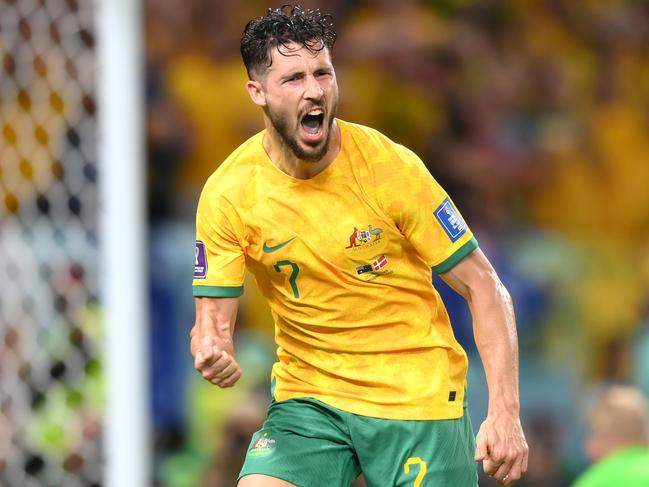
The Socceroos simply had to work hard.
Harder than they ever had.
Relying heavily on the ‘DNA’ catchcry.
This was never going to be the tournament, nor the match, for the Socceroos to try and buck the stereotype of a hard-working, strong, physical side. Instead, Arnold had decided long ago to focus on bucking the stereotype of easybeats on the world stage.
The fancy stuff could come later.
There was no greater example of this than when Riley McGree stopped the ball with his face, into open territory, but couldn’t find the right cross and lost possession. McGree chased the ball back, a kelpie down the park. He didn’t quite get it, but the missed opportunity did nothing to dull desire.
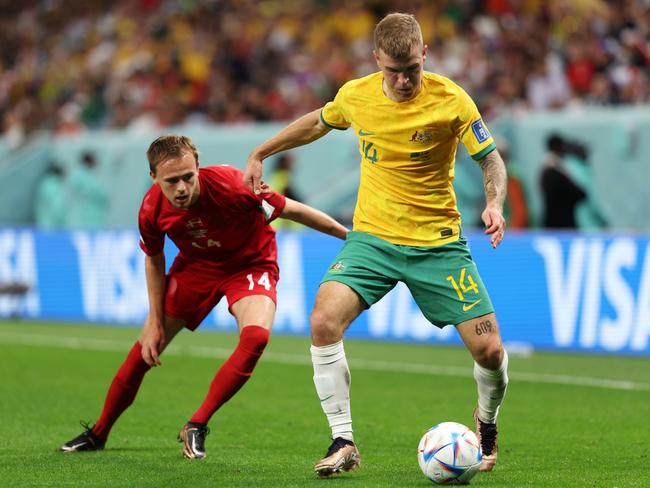
*****
The events just after the hour marked changed it all.
Tunisia scored. Australia needed a win. Leckie ran, tank gauge flashing orange, to score the goal that will be on standby if he ever needs to feel good about himself.
Australia lifted after that moment. Endorphins turned into energy, every player in a gold shirt lifted. Aziz Behich, who picked up a yellow card in the third minute after being left for dead by Danish speedster Andreas Skov Olsen, turned into a tap-dancing wizard with the ball at his feet, beating four players to nearly score the greatest goal since 10 minutes prior.
On 70 minutes, every pumping heart jumped from within, as referee Mustapha Ghorbal pointed to the spot, only to be called back for off-side. Denmark went from intricate back to their centuries old-roots; fearless physicality, with towering strikers Kasper Dolberg and Andreas Cornelius introduced.
Bailey Wright, based in England since his teenage years, came on at the back to combat it, alongside Harry Souttar. One does wonder if history would be different if the Vikings landed near the Scottish border all those years ago and Souttar was waiting for them.
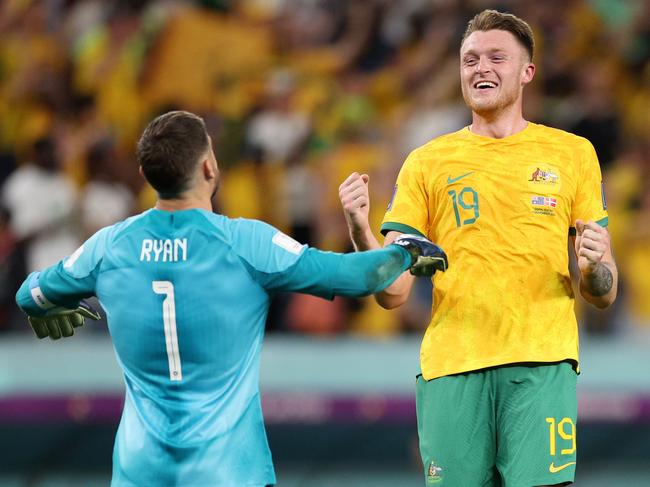
Souttar came up with two more of his trademark tackles to repel the Danes.
Time ran out.
Hard work had paid off.
What a triumph. Unthinkable six months ago.
Consider this: the Socceroos have won as many World Cup matches in five days as they have the previous 48 years. They have recorded back-to-back clean sheets for the first time in their history at the tournament. They have scored in all three group stage games at a World Cup for the first time.
And now, a second-ever Round of 16 berth.
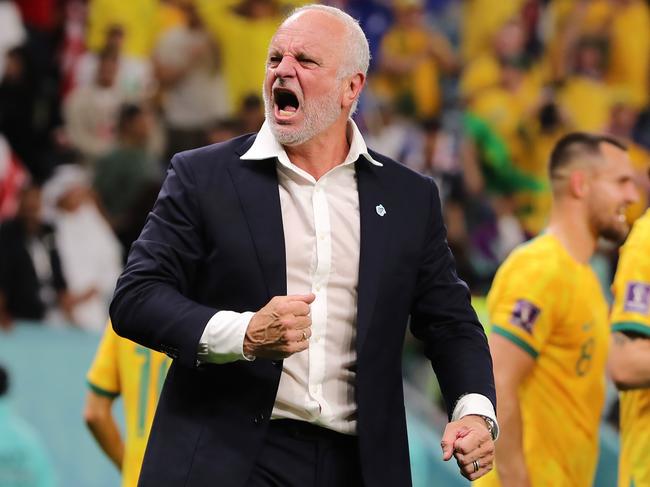
The path to this point almost ruined Socceroos staff, and Arnold himself. It went beyond the norm of preparing for football matches and finding out a way to win.
Memories will be stuck in those minds forever of the rough moments.
Of being stuck in Kuwaiti hotel rooms at the start of qualifying; in hard, lonely lockdown; of a fortnight’s hotel quarantine at ‘home’; of bumping into Saudis and Japanese with their sophisticated football environments; of players not sure if sacrifices would be worth it.
It’s all been worth it. The overriding thoughts in decades to come will be of graft. Of work. Of Aussie DNA, cringe-worthy to some, binding for the rest of time this bunch of men.
And thoughts will always be of Leckie’s goal.
Forever. What a night.
Originally published as Socceroos’ historic World Cup win over Denmark defined by fighting spirit as Australia advances to Round of 16



